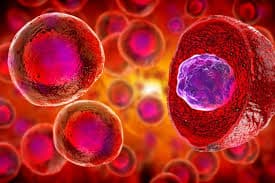About Stem Cells:
- These are cells with the potential to develop into many different types of cells in the body.
- Under the right conditions in the body or a laboratory, stem cells divide to form more cells called daughter cells.
- These daughter cells become either new stem cells or specialized cells (differentiation) with a more specific function, such as blood cells, brain cells, heart muscle cells or bone cells.
- No other cell in the body has the natural ability to generate new cell types.
- They serve as a repair system for the body.
- Stem cells are present inside different types of tissue. Scientists have found stem cells in tissues, including the brain, bone marrow, blood, and blood vessels, etc.
- There are two types of stem cells.
- Embryonic stem cells:
- These stem cells come from embryos that are 3 to 5 days old.
- At this stage, an embryo is called a blastocyst and has about 150 cells.
- These are pluripotent stem cells, meaning they can divide into more stem cells or can become any type of cell in the body.
- This versatility allows embryonic stem cells to be used to regenerate or repair diseased tissue and organs.
- Adult stem cells:
- These stem cells are found in small numbers in most adult tissues, such as bone marrow or fat.
- Compared with embryonic stem cells, adult stem cells have a more limited ability to give rise to various cells of the body.
- Embryonic stem cells:
What is Induced pluripotent stem cells?
- These are adult stem cells that have been changed in a lab to be more like embryonic stem cells.
- These cells behave in a similar way to embryonic stem cells, so they could be useful for developing a range of therapies.
Q1) What is a blastocyst?
A blastocyst is a cluster of dividing cells made by a fertilized egg. It’s the early stage of an embryo.A blastocyst forms about five to six days after a sperm fertilizes an egg. Layers of cells in the blastocyst divide and separate. They eventually become the structures that protect and nourish the developing fetus.
Source: Kanpur’s GSVM becomes 1st institute to cure blindness through stem cell transplants
Last updated on July, 2025
→ UPSC Notification 2025 was released on 22nd January 2025.
→ UPSC Prelims Result 2025 is out now for the CSE held on 25 May 2025.
→ UPSC Prelims Question Paper 2025 and Unofficial Prelims Answer Key 2025 are available now.
→ UPSC Calendar 2026 is released on 15th May, 2025.
→ The UPSC Vacancy 2025 were released 1129, out of which 979 were for UPSC CSE and remaining 150 are for UPSC IFoS.
→ UPSC Mains 2025 will be conducted on 22nd August 2025.
→ UPSC Prelims 2026 will be conducted on 24th May, 2026 & UPSC Mains 2026 will be conducted on 21st August 2026.
→ The UPSC Selection Process is of 3 stages-Prelims, Mains and Interview.
→ UPSC Result 2024 is released with latest UPSC Marksheet 2024. Check Now!
→ UPSC Toppers List 2024 is released now. Shakti Dubey is UPSC AIR 1 2024 Topper.
→ Also check Best IAS Coaching in Delhi















